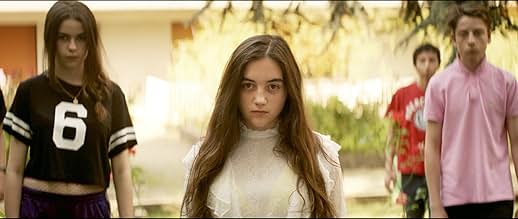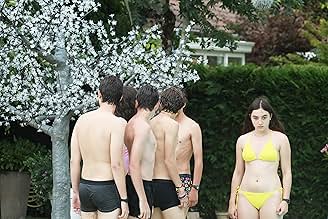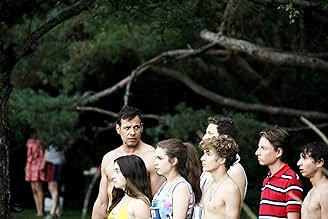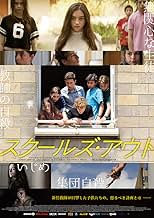IMDb रेटिंग
6.5/10
3.2 हज़ार
आपकी रेटिंग
एक शिक्षक द्वारा आत्महत्या करने के बाद एक स्थानापन्न शिक्षक को भावी प्रतिभाओं की एक क्लास का प्रभारी बनाया जाता है.एक शिक्षक द्वारा आत्महत्या करने के बाद एक स्थानापन्न शिक्षक को भावी प्रतिभाओं की एक क्लास का प्रभारी बनाया जाता है.एक शिक्षक द्वारा आत्महत्या करने के बाद एक स्थानापन्न शिक्षक को भावी प्रतिभाओं की एक क्लास का प्रभारी बनाया जाता है.
- पुरस्कार
- 1 जीत और कुल 2 नामांकन
Véronique Ruggia
- Françoise
- (as Véronique Ruggia Saura)
Félix Lefebvre
- Paulin
- (as Felix Lefebvre)
कहानी
क्या आपको पता है
- गूफ़The song that is heard when the kids perform in the graduation ceremony has not been recorded on set and it shows.
- साउंडट्रैकZombie Zombie - Free Money
फीचर्ड रिव्यू
Based on Christophe Dufossé's 2002 novel, L'Heure de la sortie (lit. trans. The Time to Exit) combines the ecological themes of films such as Take Shelter (2011) and First Reformed (2017), filtered through the milieu of Dead Poets Society (1989), but with the tonal qualities of Village of the Damned (1960) and Children of the Corn (1984). Director and co-writer Sébastien Marnier's second feature, is it a satire about liberal Generation Z snowflakes overdramatically reading apocalyptic omens into trivial matters; is it an allegory about how difficult it can be for gifted children to fit into so-called normal society: is it a metaphor for the generation gap, and how today's children can often be alienated from even relatively young adults; is it about desensitisation amongst a generation who have never known life without the internet or a world without post-9/11 paranoia; is it a desperate call-to-arms, a plea on behalf of tomorrow's adults that humanity is rapidly reaching the point-of-no-return in terms of the damage we are doing to the Earth?
When a teacher at a private middle school in France throws himself to his death in front of his students, Pierre Hoffman (Laurent Lafitte) arrives as his replacement. He soon begins to notice odd behaviour amongst a central clique of six especially gifted students, and starts following them, learning that they head to an abandoned quarry every day after school, where they have hidden a collection of DVDs. Upon viewing the discs, Pierre finds they contain endless hours of footage of industrial animal slaughter and food processing intercut with images of nuclear conflagrations, flashes of apocalyptic biblical imagery, and dire warnings about the unsustainable future of humanity. Unnerved by his find, he soon comes to believe the clique are watching him, and may even have been involved in some way with the previous teacher's suicide.
If you're looking for definitive answers here, you won't get them. Virtually none of the mysteries the film throws up, of which there are a hell of a lot, are conclusively resolved. The film is happy for you to peer inside, but Marnier steadfastly refuses to give you much info to contextualise what you're looking at, as he is far more interested in asking questions than answering them. There are certainly clues about what it all means, and the audience is pushed in certain directions from time to time, but even the final scene, although it does suggest some answers, also raises more questions.
In theory, I don't have a problem with this kind of narrative. Films built around ambiguity, where certain details are withheld, and everything is left up to subjective interpretation, can work extremely well (after all, one of my all-time favourite films is Terrence Malick's The Tree of Life (2011)). However, the mysteries of L'Heure de la sortie are very different to those found in Malick, or, say, David Lynch's Lost Highway (1997) or Mulholland Dr. (2001). Whilst Lynch's films tend to function as sensory puzzles, where the audience must bend their interpretation around what is on screen, L'Heure de la sortie is more of an intellectual conundrum, asking question after question without time to pause, and then stepping back and asking, finally, "so what do you think I was trying to say there?"
One possible interpretation of the film is an ecological one - this generation is gifting to the next a planet we have largely destroyed, something about which we're not overly bothered. The clique act as if they have no hope for the future, and that they firmly believe the world left for them (their "era" as they call it) will throw up problems the likes of which humanity will be unable to overcome.
As this might suggest, the film tackles political and social themes infinitely more weighty than those typically found in Lynch (who tends to focus on psychological issues), but as an artistic statement, I found it lacking. And whereas the absence of any obvious directorial or authorial "statement" in Lynch's work is part of what makes it so successful, here, due to the various political themes raised, the question of "what is the director trying to say" remains front-and-centre the entire time. I rarely ask myself that question when watching a Lynch film, or a Malick film, or a Guy Maddin film; I might ask it afterwards, but during the experiential moment, the artistry becomes its own referent. The narrative throws so much gasoline on the fire that it burns itself out. By roughly the half-way point, I had stopped caring why the teacher had killed himself, because there were about fifteen other unanswered questions rattling about. And it's a case of ever diminishing returns - the more mysteries that go unaddressed, the less important each of them feels.
But it's not just that there are too many mysteries. Again, this can work well in the right hands. Rather, it's that few of them ever connect to the others. Take, for example, the hobo scene in Mulholland Dr. For much of the runtime, it seems completely divorced from everything else in the film. But we do eventually learn how it relates to the main plot, even if it remains ambiguous. L'Heure de la sortie is full of what feels like completely disconnected mysteries. There's also little to reward the patient or observant viewer. with so much feeling like it exists in isolation from everything else.
Which is not to say there is nothing to like about the film. The 1980s-style retro score, by John Carpenter aficionados Zombie Zombie, is excellent, and Romain Carcanade's cinematography is superb, using anamorphic lenses to distort interiors in tandem with Pierre's crumpling mental state, and really hammering home how monumentally hot it's supposed to be, using a recurring visual motif of beads of sweat. Additionally, there are some wonderful touches in the screenplay, co-written by Marnier and Elise Griffon. For example, Pierre is writing a thesis on Franz Kafka and his apartment is invaded by cockroaches.
There are also individual scenes of great brilliance. For all its unsettling weirdness and creepy kids, for me, the most disturbing scene was one based entirely in reality. When an alarm sounds in the school, Pierre asks if it's a fire drill, and the class all but laugh at the question. Of course it isn't a fire drill - it's an active shooter drill. The students calmly gather their things and move to the wall, sitting under the windows looking into the corridor. However, when Pierre joins them, they chastise him, not once, but twice - firstly, for leaving his own things on his desk, meaning if a shooter walks by, they will look in and know someone is in there, and secondly, he forgets to turn his phone onto airplane mode. The scene is chillingly effective in it profound mundanity, not only showing us their accustomed and dispassionate response, but in hammering home the very different lives that people of Pierre's age led when they were in school. Obviously, this speaks to the generation divide, but it also speaks to issues of desensitisation; the state of the world has sufficiently traumatised these children to the point where something like this is routine; the possibility that a shooter might wander into a school and start killing people is not something any child (in any country) should live with.
All in all though, despite these elements, the film left me disappointed. It builds up very nicely in the early stages, but about mid-way through the second act, it flounders, as you start to realise it's not actually building to anything specific. Even the dénouement is insipid (although the short coda that ends the film is excellent). The characterisation is also poor, with only Pierre given any kind of arc, whilst the children themselves remain empty avatars, devoid of psychological verisimilitude. I'm also not entirely convinced that if you want to prod people into action vis-à-vis climate change, the best way to go about it is by presenting a mystery-thriller that has no intentions of explaining what is going on - the vehicle just doesn't correlate with the message. It's worth a look, but given the scope of the themes and the nature of the central message, you would hope for a lot more.
When a teacher at a private middle school in France throws himself to his death in front of his students, Pierre Hoffman (Laurent Lafitte) arrives as his replacement. He soon begins to notice odd behaviour amongst a central clique of six especially gifted students, and starts following them, learning that they head to an abandoned quarry every day after school, where they have hidden a collection of DVDs. Upon viewing the discs, Pierre finds they contain endless hours of footage of industrial animal slaughter and food processing intercut with images of nuclear conflagrations, flashes of apocalyptic biblical imagery, and dire warnings about the unsustainable future of humanity. Unnerved by his find, he soon comes to believe the clique are watching him, and may even have been involved in some way with the previous teacher's suicide.
If you're looking for definitive answers here, you won't get them. Virtually none of the mysteries the film throws up, of which there are a hell of a lot, are conclusively resolved. The film is happy for you to peer inside, but Marnier steadfastly refuses to give you much info to contextualise what you're looking at, as he is far more interested in asking questions than answering them. There are certainly clues about what it all means, and the audience is pushed in certain directions from time to time, but even the final scene, although it does suggest some answers, also raises more questions.
In theory, I don't have a problem with this kind of narrative. Films built around ambiguity, where certain details are withheld, and everything is left up to subjective interpretation, can work extremely well (after all, one of my all-time favourite films is Terrence Malick's The Tree of Life (2011)). However, the mysteries of L'Heure de la sortie are very different to those found in Malick, or, say, David Lynch's Lost Highway (1997) or Mulholland Dr. (2001). Whilst Lynch's films tend to function as sensory puzzles, where the audience must bend their interpretation around what is on screen, L'Heure de la sortie is more of an intellectual conundrum, asking question after question without time to pause, and then stepping back and asking, finally, "so what do you think I was trying to say there?"
One possible interpretation of the film is an ecological one - this generation is gifting to the next a planet we have largely destroyed, something about which we're not overly bothered. The clique act as if they have no hope for the future, and that they firmly believe the world left for them (their "era" as they call it) will throw up problems the likes of which humanity will be unable to overcome.
As this might suggest, the film tackles political and social themes infinitely more weighty than those typically found in Lynch (who tends to focus on psychological issues), but as an artistic statement, I found it lacking. And whereas the absence of any obvious directorial or authorial "statement" in Lynch's work is part of what makes it so successful, here, due to the various political themes raised, the question of "what is the director trying to say" remains front-and-centre the entire time. I rarely ask myself that question when watching a Lynch film, or a Malick film, or a Guy Maddin film; I might ask it afterwards, but during the experiential moment, the artistry becomes its own referent. The narrative throws so much gasoline on the fire that it burns itself out. By roughly the half-way point, I had stopped caring why the teacher had killed himself, because there were about fifteen other unanswered questions rattling about. And it's a case of ever diminishing returns - the more mysteries that go unaddressed, the less important each of them feels.
But it's not just that there are too many mysteries. Again, this can work well in the right hands. Rather, it's that few of them ever connect to the others. Take, for example, the hobo scene in Mulholland Dr. For much of the runtime, it seems completely divorced from everything else in the film. But we do eventually learn how it relates to the main plot, even if it remains ambiguous. L'Heure de la sortie is full of what feels like completely disconnected mysteries. There's also little to reward the patient or observant viewer. with so much feeling like it exists in isolation from everything else.
Which is not to say there is nothing to like about the film. The 1980s-style retro score, by John Carpenter aficionados Zombie Zombie, is excellent, and Romain Carcanade's cinematography is superb, using anamorphic lenses to distort interiors in tandem with Pierre's crumpling mental state, and really hammering home how monumentally hot it's supposed to be, using a recurring visual motif of beads of sweat. Additionally, there are some wonderful touches in the screenplay, co-written by Marnier and Elise Griffon. For example, Pierre is writing a thesis on Franz Kafka and his apartment is invaded by cockroaches.
There are also individual scenes of great brilliance. For all its unsettling weirdness and creepy kids, for me, the most disturbing scene was one based entirely in reality. When an alarm sounds in the school, Pierre asks if it's a fire drill, and the class all but laugh at the question. Of course it isn't a fire drill - it's an active shooter drill. The students calmly gather their things and move to the wall, sitting under the windows looking into the corridor. However, when Pierre joins them, they chastise him, not once, but twice - firstly, for leaving his own things on his desk, meaning if a shooter walks by, they will look in and know someone is in there, and secondly, he forgets to turn his phone onto airplane mode. The scene is chillingly effective in it profound mundanity, not only showing us their accustomed and dispassionate response, but in hammering home the very different lives that people of Pierre's age led when they were in school. Obviously, this speaks to the generation divide, but it also speaks to issues of desensitisation; the state of the world has sufficiently traumatised these children to the point where something like this is routine; the possibility that a shooter might wander into a school and start killing people is not something any child (in any country) should live with.
All in all though, despite these elements, the film left me disappointed. It builds up very nicely in the early stages, but about mid-way through the second act, it flounders, as you start to realise it's not actually building to anything specific. Even the dénouement is insipid (although the short coda that ends the film is excellent). The characterisation is also poor, with only Pierre given any kind of arc, whilst the children themselves remain empty avatars, devoid of psychological verisimilitude. I'm also not entirely convinced that if you want to prod people into action vis-à-vis climate change, the best way to go about it is by presenting a mystery-thriller that has no intentions of explaining what is going on - the vehicle just doesn't correlate with the message. It's worth a look, but given the scope of the themes and the nature of the central message, you would hope for a lot more.
टॉप पसंद
रेटिंग देने के लिए साइन-इन करें और वैयक्तिकृत सुझावों के लिए वॉचलिस्ट करें
- How long is School's Out?Alexa द्वारा संचालित
विवरण
बॉक्स ऑफ़िस
- दुनिया भर में सकल
- $4,87,374
- चलने की अवधि1 घंटा 44 मिनट
- रंग
- ध्वनि मिश्रण
- पक्ष अनुपात
- 2.35 : 1
इस पेज में योगदान दें
किसी बदलाव का सुझाव दें या अनुपलब्ध कॉन्टेंट जोड़ें


![Bande-annonce [OV] देखें](https://m.media-amazon.com/images/M/MV5BZWFjMjg0Y2UtMTcwNi00NjY4LTgyYTYtYmNiZGVkZWY2NDc1XkEyXkFqcGdeQXRodW1ibmFpbC1pbml0aWFsaXplcg@@._V1_QL75_UX500_CR0)

























